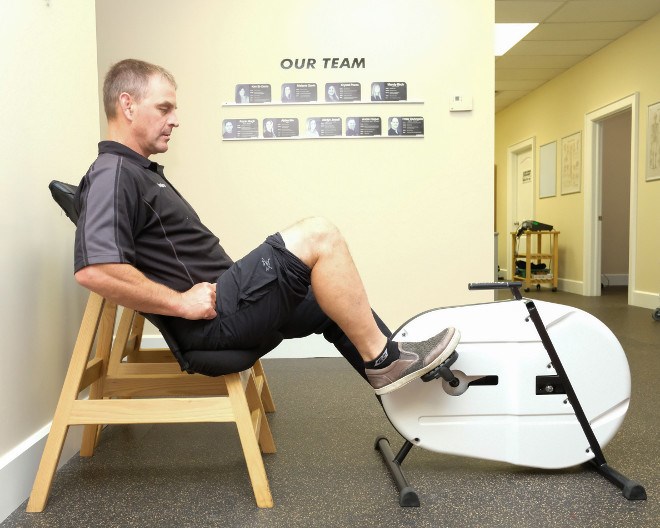Combining two of his passions – cycling and physiotherapy – has led André Riopel to develop a therapeutic pedalling machine that could assist patients with injuries and impairments to improve their health more quickly than using traditional methods.
The Viscus – named for viscosity, or the thickness of liquid – is a bicycle-like machine that employs flywheel technology to help people move.
Riopel, a physiotherapist and avid cycling enthusiast, first came up with the technology three decades ago, but is ready to introduce to the world his most recent iteration of the device.
“When you’re in the (physiotherapy) field, you see the world differently, because the people who invent stuff are not necessarily the people who actually use it, especially exercise equipment,” he said.
By day, Riopel runs Back in Motion Physiotherapy in Sault Ste. Marie. He saw that a need existed for a way to help increase mobility in people who are frail or elderly, who have neurological conditions or severe arthritis, or who are recovering from stroke or other impairments.
Orthopaedic medicine has changed drastically since the 1970s when patients were casted and kept immobile to help heal injuries – a practice Riopel said did more harm than good. Now, physicians prescribe movement to keep joints lubricated and prevent them from seizing up.
Riopel began by making modifications to existing bikes, and found that the flywheel allowed users to keep pedalling with little effort. As the machine is used more, the patient’s strength is increased, which allows them to exercise more often and improve their overall mobility.
The device is designed to be used so that it can be pedalled by foot or by hand, all while the user is seated. They can be watching TV or playing cards while using it, and because it requires little effort, users can find themselves using it for longer.
“When you take somebody who's very frail and elderly and they start to pedal, the momentum of the flywheel keeps their legs going, so it's very much akin to sitting in a rocking chair,” Riopel explained.
“Once you start rocking or swinging on a swing, the inertia of the movement takes you easily around the dead points.”
Early prototypes have been used – and in some cases are still in use – at Sault Area Hospital (SAH), Health Sciences North in Sudbury, and various long-term care facilities throughout the province. Most recently, patients at the renal dialysis unit at SAH have been using them while receiving treatment. It alleviates boredom, but also makes treatment more effective, Riopel said, because “you’re moving juices.”
Riopel has also teamed up with researchers at the Northern Ontario School of Medicine, Lakehead University in Thunder Bay and the Thunder Bay Regional Health Sciences Centre, who are studying the impacts of patients using the Viscus following total knee replacement. Early results from the study are promising.
“Only (Viscus) flywheel participants demonstrated increased knee function at follow-up compared to pre-operative measures,” read the study notes. “In addition, knee function was higher in flywheel participants compared to control participants at follow-up.”
In the earlier years, Riopel teamed up with the engineering department at Sault College to help figure out some technical issues in the design process, and he’s received some funding from the Industrial Research Assistance Program (IRAP). But most of the work has been done on his own dime.
Riopel estimates 95 per cent of the parts for the units are manufactured at a variety of factories in locations around Ontario – St. Thomas, Toronto, Mississauga and South River – but the units themselves are assembled by him in the Sault.
After three decades in development, Riopel is now ready to launch the Viscus version 3.0, what he calls his “biggest, most ambitious production to date.”
Each unit sells for about $1,000, and buyers can now purchase them directly from the Viscus website (www.viscusmovesyou.ca). Riopel said his primary market is institutional health-care facilities.
“If you’re convalescing from a joint replacement, for example, you can rent it by the month, and I’m looking for partners,” he said. “Physiotherapy clinics or people who sell therapeutic health-related products can buy units and have their own rental program in their own communities.”
His dream is to catch the eye of a bigger producer which could help bring the product to a larger market. But if that doesn’t happen, Riopel is content knowing he’s made a difference in the lives of so many.
“I do this because it helps people – that’s my number one thing,” he said. “Hopefully, in four or five years, my device or similar devices will be all over the place, because it makes so much sense.”




